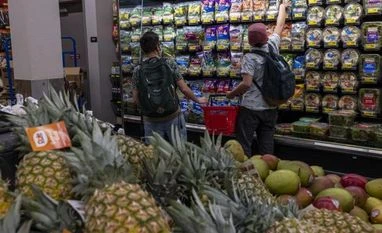The United Nations chief has warned that Russia's war on Ukraine is holding a sword of Damocles over the global economy, especially poor developing countries that face skyrocketing food, fuel and fertiliser prices and are now seeing their breadbasket being bombed.
Secretary-General Antonio Guterres told reporters on Monday that Russia and Ukraine represent more than half of the world's supply of sunflower oil and about 30 per cent of the world's wheat and that grain prices have already exceeded those at the start of the Arab Spring and the food riots of 2007-2008.
He told reporters that 45 African and least developed countries import at least one-third of their wheat from Ukraine and Russia, and 18 of them import at least 50 per cent. These countries include Egypt, Congo, Burkina Faso, Lebanon, Libya, Somalia, Sudan and Yemen, he said.
All of this is hitting the poorest the hardest and planting the seeds for political instability and unrest around the globe, Guterres warned, saying the most vulnerable country had already been trying to recover from the COVID-19 pandemic and contend with record inflation, rising interest rates and looming debt before the Ukraine war.
David Beasley, executive director of the UN World Food Program, told The Associated Press during a visit to the western Ukrainian city of Lviv that 50 per cent of the grain the agency buys to feed the 125 million people we reach on any given day, week or month comes from Ukraine, as does 20 per cent of the world's supply of corn.
So (the war) is going to have a dynamic global catastrophic impact, Beasley said.
More From This Section
Guterres reiterated his call for an immediate cessation of hostilities and serious negotiations toward peace. Ukraine is on fire, he said, adding that the impact on civilians is reaching terrifying proportion.
He announced an additional USD40 million from the UN's emergency fund to move critical supplies of food, water and medicine into Ukraine, where at least 1.9 million people are displaced. More than 2.8 million others have fled Ukraine to other countries.
UN humanitarian staff report that in the besieged southern port city of Mariupol trapped civilians face life-threatening shortages of food, water, medicine and other basic necessities, UN deputy spokesman Farhan Haq said.
The UN children's agency UNICEF, the World Health Organization and the UN Population Fund said that horrific attacks are killing and causing serious injuries to patients and health workers, destroying vital health infrastructure, and forcing thousands to forgo accessing health services despite catastrophic needs. They called the attacks an act of unconscionable cruelty.
At UN headquarters, a draft UN resolution on the humanitarian crisis is being moved from the 15-member Security Council, where Russia has veto power, to the 193-member General Assembly, where there are no vetoes.
Co-sponsors France and Mexico said in a joint statement Monday that their absolute priority is to obtain an immediate halt to hostilities to protect Ukraine's civilian population and allow humanitarian aid to be delivered to millions of needy people. They also said a significant number of countries not on the Security Council want to participate in promoting a resolution.
)